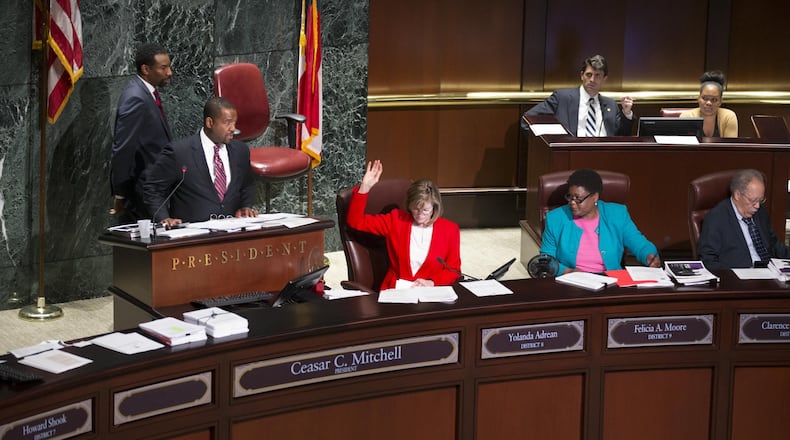Atlanta officials completed the largest expansion of the city's borders in 65 years Monday, absorbing Emory University and the Centers for Disease Control and Prevention despite objections that the move takes money from DeKalb County public school students.
The Atlanta City Council voted 13-0 to approve annexing the 744 acres along the city’s eastern edge. The incorporation of the prestigious research university into the state’s capital city is the most significant annexation since Buckhead was added in 1952.
It's a move that brings an additional 6,400 residents into the city and could allow MARTA to run a new streetcar line to the campus. The Clifton Corridor project would use Atlanta transportation sales tax money to build the line from Lindbergh Center station.
The annexed areas, which also include Children’s Healthcare of Atlanta and Villa International, will remain in DeKalb County but become a part of the city on Jan. 1, according to the ordinance approved Monday by the City Council.
“Today’s decision to annex the Emory University area is historic and transformative,” said Mayor Kasim Reed. “The annexation … presents the rare opportunity to bring a world-class teaching and research institution, and two of the leading national public health institutions of the United States, into the City of Atlanta.”
But parents of DeKalb public school students objected to the Council's decision to include the area in Atlanta Public Schools.
Though fewer than 10 public school students live in the affected area, Atlanta Public Schools will gain $2.25 million in property tax revenue that currently funds DeKalb schools.
“The Emory annexation encroaches upon the wishes and needs of the Druid Hills community,” Merrill White-Fears, a DeKalb parent, told the Council. “This annexation, as presented, strips resources from disadvantaged students.”
Until last week, the annexation proposal didn’t alter DeKalb school districts. That changed at the urging of Council members and Atlanta Public Schools. They argued that schools should be included in any incorporation. The change in schools takes effect July 1.
“It’s unfair that Atlanta is taking over our schools,” said Vickie Turner, a member of the DeKalb school board. “We have a culture of distrust, and this feeds into that. What happened to the collaboration? What happened to the partnerships? What happened to the discussion? It’s not acceptable.”
The annexation has been in the works since August 2016, when the university announced plans to petition to become part of Atlanta.
“Working together, Emory University and the city of Atlanta will continue building a stronger future for neighborhoods across the metropolitan area,” said Emory President Claire Sterk. “Emory is not leaving DeKalb County. We remain steadfastly committed to our colleagues and neighbors in county leadership and beyond.”
Because all of the area’s property owners agreed to the annexation, it could be accomplished without a referendum of voters, according to state law. Only approval from Atlanta’s City Council was required.
Still, the city and Emory had to overcome several obstacles.
Because the land proposed for annexation had to physically abut the city, Emory bought a house last year that stood between its land and Atlanta.
Then DeKalb's government objected to the annexation this summer, saying it could result in over-development and increased sewer system costs. The county's concerns forced Atlanta into arbitration, which resulted in the city making concessions. Atlanta agreed to preserve existing zoning restrictions and pay DeKalb $1 million a year for the next decade for the county to provide fire service, according to a settlement.
Finally, the disagreement over school system boundaries delayed approval of the annexation until the city’s elected officials sided with APS.
“For 145 years, the city of Atlanta and Atlanta Public Schools have shared boundaries,” said Erica Long, a policy and governance specialist for APS. “We look forward to the continuation of that precedent.”
Since the annexation doesn't take effect until next year, the 2,500 registered voters in the newly added area are ineligible to participate in Tuesday's election for mayor.
When the area becomes a part of the city, Atlanta will take over police, permitting and zoning, while DeKalb will still manage firefighting and sewers.
Emory’s annexation could be just the beginning of incorporations in the Druid Hills community. Adjacent neighborhoods might ask the city to take them in as well, further transferring public school students, tax revenue and services from the county to the city.
By the numbers
744: Acres being annexed into the city of Atlanta
6,376: Population of area
2,491: Number of registered voters
Less than 10: Number of public school students
$2.25 million: Property tax revenue gained by Atlanta Public Schools
About the Author
Keep Reading
The Latest
Featured




